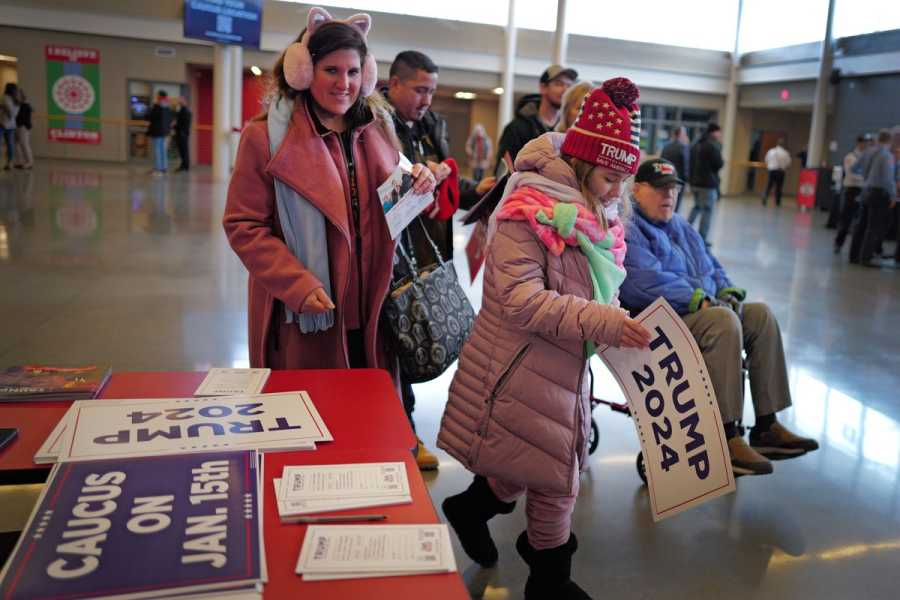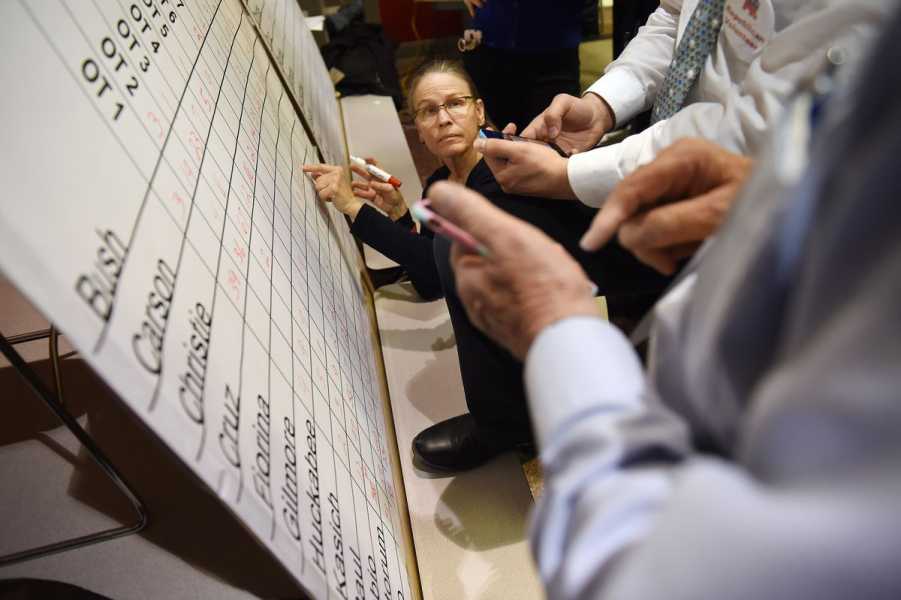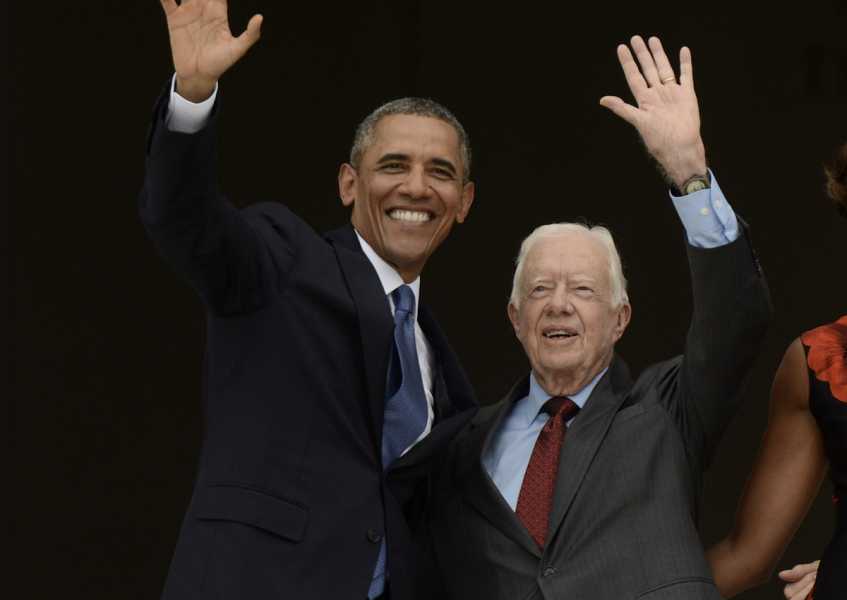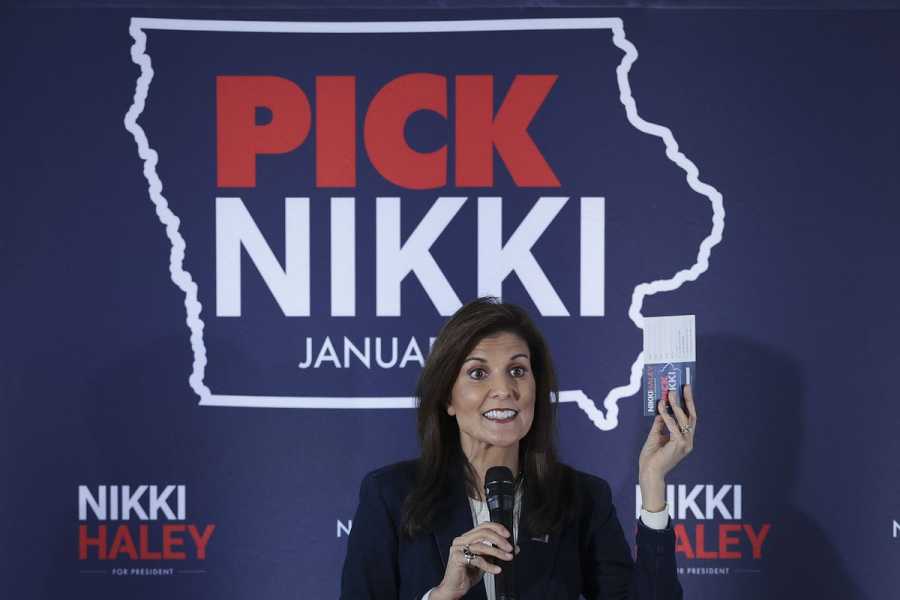It’s a small state that can make a massive impact on the political world. Here’s how that happens.

Supporters attend a rally for Republican presidential candidate and former President Donald Trump at a middle school in Clinton, Iowa, on January 6, 2024. Getty Images Andrew Prokop is a senior politics correspondent at Vox, covering the White House, elections, and political scandals and investigations. He’s worked at Vox since the site’s launch in 2014, and before that, he worked as a research assistant at the New Yorker’s Washington, DC, bureau.
Polls show Donald Trump as the clear favorite to win the GOP Iowa caucuses on Monday, January 15. But the true stakes of the contest are about more than just who comes in first. The political world will be watching Iowa’s results closely in an attempt to get a sense of where the GOP race is going.
The caucus results will give one early indication of whether Trump really will romp to the nomination or face a closer fight than expected. They’ll basically determine whether Ron DeSantis can stay in the race. Yet for Nikki Haley, they may not mean all that much — expectations are low for her in Iowa, since she has a better opportunity to break through in the next contest, the New Hampshire primary on January 23.
It may seem somewhat strange that Iowa’s results would need decoding like this. But that’s key to how Iowa’s influence works. It isn’t about the paltry number of delegates at stake. Rather, Iowa matters because of how it affects the perceptions of the political world.
Media, party insiders, activists, the candidates themselves, and even voters in other states think the caucus results reveal a great deal about which candidates can win elsewhere. The contest for Iowa isn’t really a contest for delegates; it’s a contest to look good.
This year, all this lofty import only applies to the Republican caucuses — Democrats stripped Iowa of its first-on-the-calendar status, substituting South Carolina instead, for various reasons: a 2020 vote-counting debacle, concern that Iowa is too white for a party increasingly emphasizing diversity, and Joe Biden’s political interests.
But in what’s generally been a stagnant, undramatic Republican race, Iowa presents the first real opportunity for voters to weigh in, defy polls, and shake up the contest. Of course, they could — and probably will — simply affirm Trump’s overwhelming lead. But if polls were perfectly reliable, we wouldn’t need the voters at all, would we?
What are the Iowa caucuses?

Mariannette Miller-Meeks, center, helps to total vote numbers at Ottumwa High School for the Republican caucus on February 1, 2016, in Ottumwa, Iowa. Matt McClain/The Washington Post via Getty
The Iowa caucuses are the first time actual voters across any US state get up and go vote on whom they want to be president — though, this year, only Republicans will be doing that.
These voters literally have to “get up and go” — to an in-person event, held at a specific time in the evening, at one of more than a thousand precincts across the state. Absentee voting is not permitted, except for a small number of military and overseas voters.
Now, you may have an image in your head of the Iowa caucuses looking like participatory democracy in action — people gathering in their local precincts, sitting or standing with a group of their presidential candidate’s supporters, and going through multiple rounds of voting where candidates are eliminated and voters can change their minds.
None of that is true anymore.
For Republicans, that’s never how the caucuses worked. Since 1980, the first year the caucuses were a big deal in the presidential nomination contest, Republicans have made their choices through a simple secret ballot written vote. That’s how it will work this year, too.
Iowa Democrats had long tried to do things differently, using the lively process described above — they wanted public debate and deliberation. But over the years, criticism mounted over the caucuses’ complexity, lack of transparency, and barriers to participation (the old caucus gatherings could last for hours, which can be a challenge for people who have child care or work, or don’t want to drive late at night).
Democrats’ attempts to address those criticisms with a new voting process in 2020 ended in a disastrously delayed and flawed vote count. The Democratic National Committee then stripped Iowa (and New Hampshire) of special permission to hold early contests. So this year, Iowa Democrats will vote on the presidential choice by mail instead, as just one of many states that will announce results on Super Tuesday in early March.
Why do the Iowa caucuses matter?

Then-President Barack Obama and former President Jimmy Carter wave at a 2013 event Michael Reynolds via Bloomberg
To win the nomination contest, a candidate needs to win a majority of the delegates at stake in state primaries and caucuses across the country. The day after the Iowa caucuses, hardly any of those delegates will have been locked down, and in theory the contest would still be totally wide open. Yet in practice, Iowa’s results often make a dramatic impact on the race, dooming certain candidates while boosting others.
That’s for a few reasons. It’s the first actual contest after a long year or so of campaigning. In theory, it’s a place where an underdog can make a splash — it’s a small state that purportedly privileges shoe leather and on-the-ground campaigning over big ad spending.
Plus there’s history: Iowa has been the launching pad for two men who did not initially lead national polls but went on to become president of the United States: Jimmy Carter and Barack Obama. For both, the caucus results generated tons of positive media coverage and a national surge in polls (though both faced long contests ahead before locking down the nomination).
Even when the Iowa winner doesn’t end up winning the nomination (as with Mike Huckabee, Rick Santorum, and Ted Cruz, the three most recent GOP winners in contested caucuses), results can shake up the race by elevating them, rather than other candidates, to prominence in the contest.
But it’s important to understand that not every candidate is affected equally by the caucuses. Iowa matters primarily because of how it changes the perceptions of the political world. And candidates are, in large part, judged by whether their caucus performance meets the expectations of the media and political elites.
For instance, in the 2008 GOP caucuses, Mitt Romney came in second and John McCain came in fourth. Yet Romney was portrayed as a big loser, since he had been campaigning hard in Iowa and had once seemed the favorite to win. McCain, meanwhile, hadn’t really been trying to win Iowa and was focusing instead on doing well in New Hampshire, so his fourth place finish wasn’t interpreted as a stunning setback for him.
“Every candidate in Iowa has the same opponent, and that opponent’s name is ‘expected,’” Dennis Goldford, a political science professor at Drake University, told me back in 2016. “The caucuses are about who exceeds expectations and who fails to. And who sets expectations? You and I do.”
But how does Iowa’s influence actually work?
The political world is obsessed with the question of who can actually win in each presidential nomination race. And a large part of that world has come to believe that the caucus outcomes help shed some important light on that question.
It’s pretty weird: Essentially, the Iowa caucuses are important because the media, the candidates, and the political world more broadly treat their results as greatly important in determining who can win. And this plays out in several interacting ways:
- The media hypes up the Iowa results, branding candidates as winners and losers based on how they performed there. So the winners get tons of excited coverage, but the losers become afterthoughts. And, particularly in multicandidate fields, winning media coverage is hugely important.
- Donors and activists, too, look at the Iowa results to judge whether the candidates they’re supporting are still viable. A poor Iowa performance will likely mean fewer campaign donations and endorsements, which makes it more difficult for a candidate to stay in the race. (I’m looking at you, Ron DeSantis.)
- Voters in other states — especially those trying to make sense of complex, multicandidate fields — can take the Iowa results (and the media coverage of those results) as cues about which contenders can actually win. Accordingly, poll results in other states can change quickly after the Iowa results sink in.
- The candidates naturally take all this into account, and so many of them have invested huge amounts of time and money to try to do well in Iowa. And when the results come in, candidates who do poorly often take the hint and quit the race (spurred by donors who will no longer fund their campaigns, media outlets that no longer cover them, and subsequent polls showing they’re performing poorly elsewhere). This shrinking of the field is a process known as winnowing.
- And all of these factors amplify each other: This behavior from candidates further assures the media that the caucus results are really important, which justifies even more coverage of Iowa.
All of these dynamics, it should be noted, also apply to New Hampshire (and, to a decreasing degree, to other states as the process continues). The media, the candidates, political elites, and, to a certain extent, voters in other states all act on the signals they believe Iowa and New Hampshire are sending them. And that’s how these early state contests dramatically reshape the nomination landscape long before the vast majority of the American people get to weigh in.
What are the expectations for this year’s Iowa caucuses?

Republican presidential candidate and former UN Ambassador Nikki Haley holds up a commit-to-caucus card while speaking during a campaign event on January 11, 2024, in Ankeny, Iowa. Win McNamee/Getty
Three significant candidates — and one hanger-on — remain in the Republican race, and each faces a different set of expectations in Iowa against which their performance will be judged.
Donald Trump has long been the overwhelming frontrunner nationally and in Iowa. So the political world will be watching his Iowa results to discern if there is even the slightest indication that he is not, in fact, invincible.
Trump has been polling around 50 percent in Iowa, so if he gets about that vote share or higher, that would seemingly confirm his dominance over the party — with the caveat that everyone understands New Hampshire is next and weird things can happen there.
If Trump wins Iowa but underperforms his polls — getting significantly below 50 percent — he will look “weaker than expected” and there will be chatter about whether he is more vulnerable than commonly believed. And if he somehow loses Iowa, that would be taken as a stunning catastrophe — though it likely wouldn’t be fatal, since everyone understands it’s Iowa and weird things can also happen there.
Nikki Haley has been battling with DeSantis for second in Iowa polls, hovering around 15 to 20 percent of the vote — but the expectations for her in the caucuses aren’t so high, since political observers agree that New Hampshire is a more promising opportunity for her.
If Haley dramatically underperforms her polls, eyebrows will be raised, but she’ll still get to take her shot in the Granite State. But if she over-performs and gets a strong second place (ahead of DeSantis, closer than expected to Trump), she’ll be perceived as the “true winner” of the Iowa caucuses. Even though she didn’t, you know, win them.
A question of minor intrigue is whether Haley will finish second or third (behind DeSantis). I don’t think too much hinges on that, but, of course, a better finish for her would be more helpful.
Ron DeSantis has spent much of the past year declining in the polls and losing donors, and he’s bet everything on Iowa as his one shot for a comeback. A third place finish behind Haley would almost certainly end his campaign, losing him his last remaining support from GOP donors. He could decide to push onward with a second place finish, but it’s difficult to envision what his next opportunity for success would be. To revitalize his chances in the race, DeSantis really needs to over-perform his polls quite dramatically.
Then there’s Vivek Ramaswamy, who is more of a wild card. After a brief burst of attention several months ago, media and GOP voter attention have largely moved on from Ramaswamy, who’s been stuck at single digits in polls. He has been campaigning very intensely in Iowa, so an unimpressive performance there would likely suggest he won’t do too well anywhere else, either. However, Ramaswamy is largely self-funding his campaign and could theoretically stay in as long as he wants, since donors won’t be able to force his hand by stopping payment of his staffers’ salaries.
To summarize, here’s what it would take for each candidate to be a caucus “winner”: Trump needs a commanding first place with about 50 percent of the vote or more, Haley needs a decent second place, DeSantis needs a very strong second place, and Ramaswamy, who knows.
Isn’t democracy beautiful?
Portions of this article were originally published in 2016 and 2020.
Sourse: vox.com






